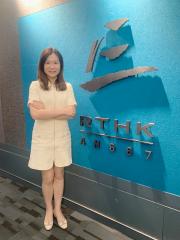簡介
Listen to #Hashtag Hong Kong every Sunday morning at 8.15
Focussing on issues affecting civil society, we'll hear from representatives of NGOs, associations, statutory bodies, and non-profit groups.
(Sundays 8.15am - 8.25am)
最新

Chris Leung, Social Worker, The Lok Sin Tong Benevolent Society
Hi everyone, I am Chris, the Deputy Centre-in-Charge of the Sham Shui PO Community Living Room of the Lok Sin Tong Benevolent Society, Kowloon.
According to the "Long-Term Housing Strategy - Annual Progress Report 2022," the government has secured sufficient land to build public housing units, fulfilling the supply targets for the next ten years. However, as the allocation of land for housing is not evenly distributed annually, only about one-third of these units will be completed in the first five-year period.
Hong Kong nowadays is facing a housing shortage, and many citizens would choose to live in subdivided flats. According to statistics released by the Census and Statistics Department in 2021, there are approximately 108,200 subdivided units for rent in Hong Kong, with an average of 3-4 partitioned rooms per unit. The median living space per person is only 56.5 sq. ft., lower than the 75 sq. ft. standard for public housing and the 161.5 sq. ft. for the average household in Hong Kong.
Apart from limited living spaces, subdivided units are also facing several problems like heavy water and electricity charges, safety issues, etc. The poor living environment has poses impacts on residents’ physical and mental health that most of them have to bear heavy financial burden and parenting.
In view of that, the Social Welfare Department (the "SWD") launched the "Community Living Room Pilot Scheme" funded by the Community Care Fund. The Sham Shui Po Community Living Room Project locates in Fuk Wa Street, Sham Shui Po, in where subdivided housing is concentrated. The Project focuses on supporting subdivided unit households, especially those with children, in order to alleviate the difficulties they face while waiting for public housing and living in poor conditions, and provide critical support during the transition period.
As a Government, Business, and Community tripartite collaboration project, the government has appointed THE LOK SIN TONG BENEVOLENT SOCIETY, KOWLOON, as the approved service organization to operate the Project, providing shared living spaces including pantry, dining room, living room, study and activity room, children's play facilities, fitness facilities, and self-service laundry facilities, as well as providing community information, health talks, After-school Learning and Support Programmes, community support and referral services. The Sham Shui Po Community Living Room has commenced operation since December 2023. It will operate for a period of three years. With the support of various sectors, the Project has already recruited over 500 families to provide them with services.
In this cross-sectoral collaboration project, not only could the users enjoy additional living space, but they could also broaden their social networks, thereby improving their quality of life and increasing their sense of community belonging. The after-school study support, provided by the Community Living Room, is aimed at alleviating pressure on parents to supervise their children’s homework. The project not only relieves the onus on parents as caretakers; it also lightens their housekeeping workload. Living in a relatively small and crowded flat, most of the users do not have space at home for a washing machine and need to wash clothes by hand. Now, however, they are able to make use of laundry services in the Community Living Room, which are available at an affordable price. User can build up their social network in the Community Living Room as well.
We will continue to actively expand the scope of services, and strive to help the sub-divided unit households in the Sham Shui Po district to improve their living space, sense of community belonging, and social networks after using the community living room facilities. In the long run, to elevate the living standards and enhance community belonging of grassroots citizens, we believe that with the participation of the business sector in setting up more Community Living Rooms in districts clustered with subdivided unit households, more grassroots families will benefit.
Three community living room projects in To Kwa Wan, Hung Hom and Nam Cheong are expected to commence operations gradually to provide support for subdivided unit households, particularly those with children. These four community living rooms are expected to serve 1,750 subdivided households, encompassing a population of around 270,000 individuals each year, to provide a better living standards for the residents.
And now I have a song I'd like to dedicate to all of you listening. My song is: "陪著你走” by Rubber Band
重溫
Maggie Lee, Executive Director of Hong Kong Alzheimer's Disease Association
“File does not exist” …….
“This file is corrupted and cannot be opened” …….
These may be common problems in our daily computer use.
Then how about the brains of people with dementia? Memory and the files in their brain are always broken and difficult to recall.
Dementia is a degenerative disease of the brain. The deterioration usually starts very slowly, being forgetful at first. Eventually, it can develop into obvious memory loss, inability to self-care, being lost, not recognising loved ones and forgetting important moments in life.
“Who are you?”, “Where am I?” are heartbreaking questions but repeated by people with dementia at every moment. Please remember, Dementia is not normal ageing, but a disease that causes memories to fade from the recent to distant past.
In Hong Kong, about 10% of people over the age of 65 live with dementia, and over the age of 85 is as high as one-third. We all know that Hong Kong is facing an ageing population and the prevalence of dementia will sharply increase. There are currently about hundred and fifty thousand people living with dementia in Hong Kong. The number will double in the next 15 years. However, is Hong Kong ready for the silver tsunami?
The development of a comprehensive plan for dementia care by our policymakers would be the crucial way out for our future. Countries or cities around us, such as China, Macau, Singapore, and Japan, have already developed national plans to prepare society for the challenges. But we are still in its infancy.
“Never too Early, Never too Late” is the theme of World Alzheimer’s Month this year. We aim to arouse everyone’s importance on risk reduction in delaying and potentially preventing the onset of dementia. I think policy planning should also be “never too early, never too late”, We need to take action before family caregivers, and our health and social care systems collapse.
Different interventions are effective in dementia management. It is imperative to grasp the golden opportunity in the earliest stage. Unfortunately, the diagnostic rate of dementia has remained at only 10% for the past few decades. That means the majority of the people living with dementia are still without proper interventions and support.
Memory problems in the early stage can easily be mistaken as signs of normal ageing. Neither the people with dementia nor their families and friends realize it until more obvious problems happen in their daily lives. Moreover, family size in Hong Kong is getting smaller and there are more and more childless couples, early symptoms may go unnoticed if people do not interact closely in day-to-day life.
Public education to increase awareness of early signs of dementia, easily accessible diagnostic services, and shorten waiting time, all of these should be put into action.
Dementia is referred to as the “long goodbye”, our beloved seems to be becoming a stranger slowly. In my 20 years of walking with families, I know too well how frustrating it can be when a loved one has dementia. But I keep encouraging the families to appreciate what our beloved can still do and remember, and try to keep them for as long as possible. We may worry about the next deterioration coming, but while waiting for the future, what deserves more attention is the current him/her.
If you or your beloved are living with dementia, don’t give up. Drugs can help. Different brain-stimulating activities and caring techniques can ease the symptoms or slow down the deterioration. Equipment and technology can help to make life easier. We are here to walk through it with you. You are not alone, just let us know.
If you are healthy, congratulations, but remember “Never too early, Never too late”, take actions to reduce the risk factors of dementia. A healthy lifestyle, regular exercise, healthy and balanced diet, stay mentally and socially active. All these can help. Please remember to use and keep your brain active or you will lose it.
September is World Alzheimer’s Month, an international campaign initiated by Alzheimer’s Disease International (ADI) to raise awareness and remove the stigma of dementia. As the sole member of ADI in Hong Kong, we invite you to join us in caring about the brain health of your families, neighbours and friends, supporting those living with dementia around you and seeing if we can help.
Finally, I’d like to dedicate the song “I'm Not Gonna Miss You” by Glen Campbell to all people with dementia and their caregivers. The disease may take the memory, but not of the love you share and cherish.




















